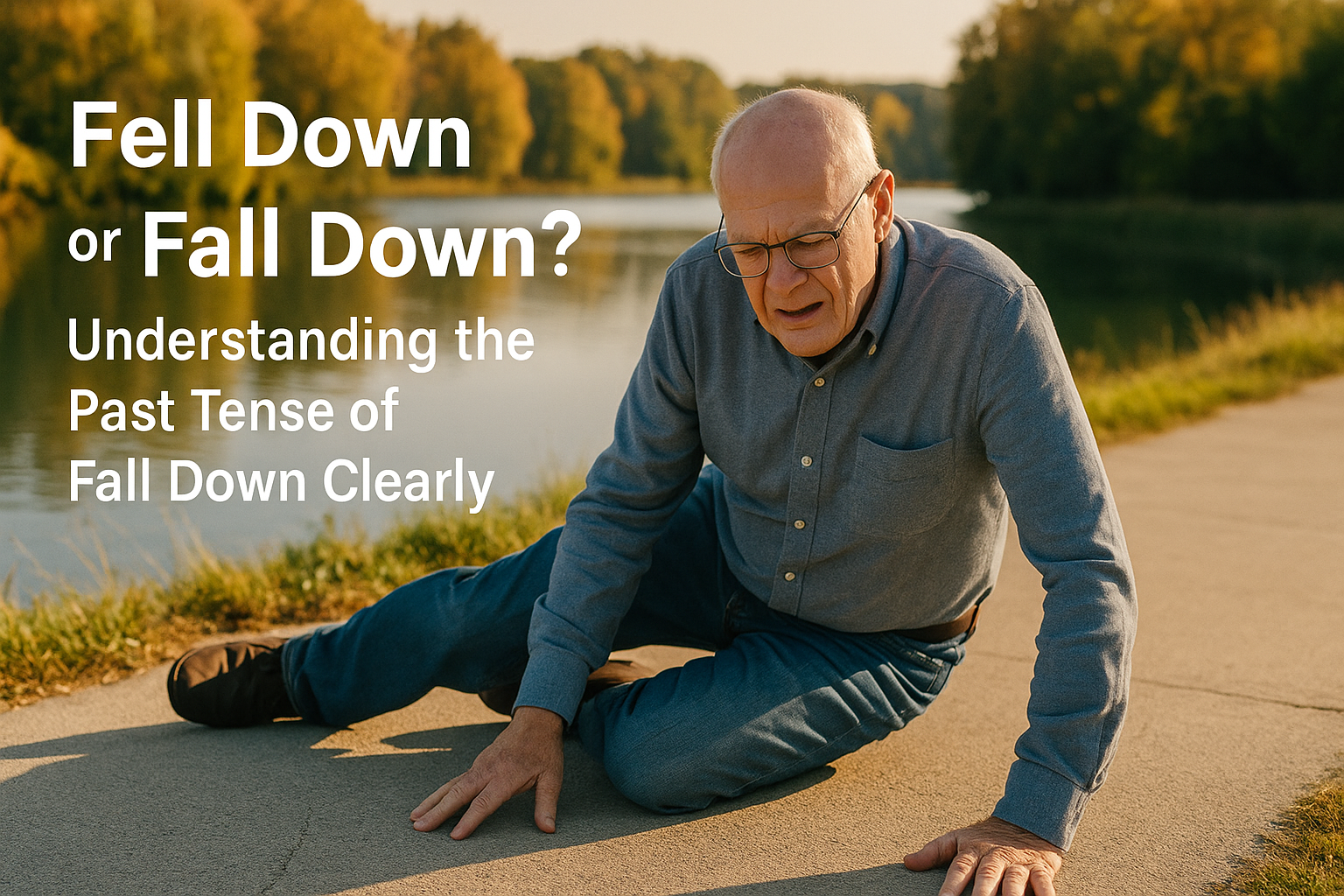Tripping over a step or slipping on ice—when that happens, you need the right verb. Should you say you fall down or that you fell down? Learning the past tense of fall down gives clarity and improves your English fluency.
What Fall Down Actually Means
Talking about fall down starts with knowing what it describes. It refers to unintentionally descending from a higher level to a lower one—often because of imbalance or an outside force. Think slipping on wet tile, losing footing on a grassy slope, or stumbling on uneven sidewalk.
- Fall down = lose balance and descend unexpectedly
- Used in everyday scenes: sports practice, toddler walking, hiking trips
- Example: Every time I wear high heels, I worry I might fall down.
This phrasal verb is straightforward, yet many learners misuse its past form.
Read More About This Article:
Paradox vs Paradigm: What’s the Real Difference and Why It Matters in Thought and Language
The Correct Past Tense: You Fell Down
When something happened in the past, you say fell down—never fall downed or falled down. Since fall is an irregular verb, it changes form rather than adding “‑ed”.
Key point: The past tense of fall down is fell down.
- They fell down while racing to catch the bus.
- My son fell down twice before learning to skate.
Avoid common errors by memorizing that fall becomes fell in the past.
Irregular Verb Structure: Why Fall Changes to Fell
English features many irregular verbs; fall fits in this group. With irregular verbs, the past tense doesn’t use the regular “‑ed” ending. Instead, the root often transforms.
Fall Verb Conjugation
| Tense | Conjugation | Example |
|---|---|---|
| Present Simple | fall down | I fall down sometimes. |
| Past Simple (correct) | fell down | I fell down yesterday. |
| Present Perfect | have/has fallen down | She has fallen down once. |
| Past Continuous | was/were falling down | They were falling down when… |
| Future Simple | will fall down | I will fall down if I’m not careful. |
Use this table to solidify your understanding and proper use.
Synonyms & Alternatives: Expand Your Vocabulary
You don’t always need to repeat fall down. These synonyms bring variety and nuance:
🌀 Alternatives for Fall Down:
- tumble
- trip
- slip
- collapse
- descend unintentionally
🔹 Past Tense Synonyms for Fell Down:
- tumbled
- tripped
- slipped
- collapsed
- plummeted
Example rewrite:
- Original: She fell down the hill.
- Alternative: She tumbled down the hill.
These variations make your language richer and more precise.
Common Mistakes & Confusion to Avoid
Here are frequent misuses to watch out for:
- ❌ They fall downed on the way home.
✅ They fell down on the way home. - Mixing fell and fallen incorrectly:
I have fell down should be I have fallen down. - Confusing past simple with past participle forms.
Tip: Remember this pattern—fall → fell → fallen. Practice using them in real sentences to lock it in your mind.
Example Sentences in Every Tense
Using fall down and fell down in context helps cement understanding.
- Present: Children fall down often while running.
- Past: My grandma fell down last week.
- Future: I will fall down if I’m not careful.
- Continuous: He was falling down when I reached him.
- Perfect: She has fallen down three times this week.
These real-life sentences highlight correct forms and usage.
Etymology: Tracing Fall Down Back in Time
The verb fall originates from Old English “feallan”, meaning to drop or descend. Adding down serves as a direction intensifier, clarifying the action of moving downward.
This phrase evolved over centuries into modern English, maintaining its clear, physical meaning.
Real-Life Scenarios Where Fall Down and Fell Down Apply
Consider these everyday situations:
- A toddler learning to walk may fall down multiple times—often fell down in the first few weeks.
- A soccer player might slip on rain-soaked grass and fell down mid-game.
- On slippery pavement, adults might fall down and later describe: “I fell down twice today.”
Using these real-world contexts helps grasp natural English usage.
Quick Grammar Review Table
| Element | Correct Form | Common Mistake | Example |
|---|---|---|---|
| Base Verb | fall down | fall downed | I fall down on ice. |
| Past Simple | fell down | fall downed/falled down | She fell down walking the dog. |
| Past Participle | fallen down | fell down (not with “have”) | She has fallen down twice. |
| Incorrect Form | (N/A) | fall downed | Avoid this in writing and speech |
This table helps keep your grammar clean and correct.
Why Using Fell Down Correctly Matters
Using the past tense of fall down properly shows clear understanding. It avoids awkward, incorrect forms like falldowned.
Whether you’re writing an essay, giving instructions, or just texting friends, using fell down instead of mistaken forms improves communication instantly.
FAQs for English Learners
Is “fall downed” ever correct?
No. It’s a mistake because fall is irregular. Always use fell down for past simple.
What’s the difference between fell and fallen?
- Fell = simple past (e.g., He fell down.)
- Fallen = past participle (used with have or has)
Can you leave off “down” and still use the past tense correctly?
Yes. You can say fell, but fell down emphasizes the fall and direction.
Final Takeaway: Use Fell Down for the Past
Remember: fell down is the proper past tense of fall down.
Avoid wrong versions like fall downed or falled down.
Use the table and examples above as guides and practice getting it right.
Whether you’re telling a story, writing an email, or helping a child with homework—knowing this grammar detail matters.

